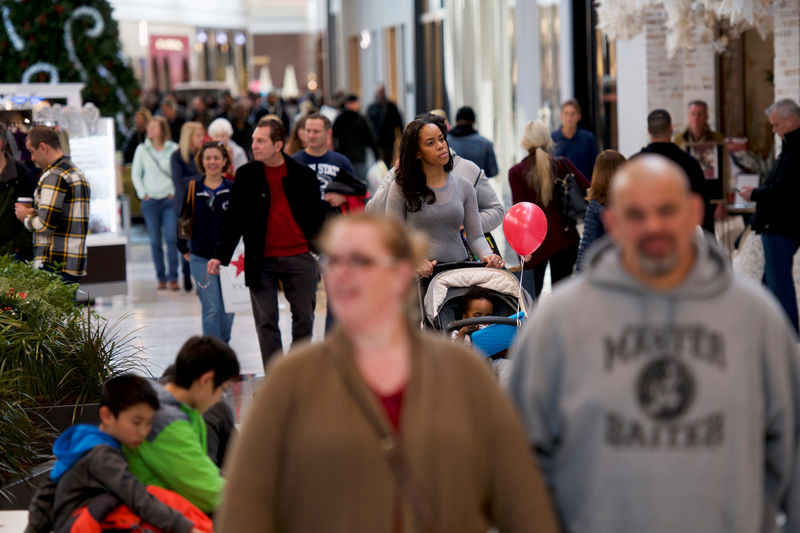By Lucia Mutikani
WASHINGTON (Reuters) - U.S. retail sales fell for the first time in seven months in September, suggesting that manufacturing-led weakness could be spreading to the broader economy, keeping the door open for the Federal Reserve to cut interest rates again later this month.
The downbeat report from the Commerce Department on Wednesday came on the heels of data this month showing a moderation in job growth and services sector activity in September. Signs of cracks in the economy's main pillar of support, ahead of the holiday season, could further stoke financial market fears of a sharper slowdown in economic growth.
The economy is being hamstrung by a 15-month trade war between the United States and China, which has soured business sentiment, leading to a decline in capital expenditure and a recession in manufacturing.
"This morning's report solidifies concerns of the consumer's inability to perpetually support the economy alone," said Lindsey Piegza, chief economist at Stifel in Chicago. "With business investment declining and manufacturing activity deteriorating, many investors brushed off fears of a slowdown because the consumer was still spending."
Retail sales dropped 0.3% last month as households cut back spending on motor vehicles, building materials, hobbies and online purchases. That was the first drop since February. Data for August was revised up to show retail sales rising 0.6% instead of 0.4% as previously reported.
Economists polled by Reuters had forecast retail sales would climb 0.3% in September. Compared to September last year, retail sales increased 4.1%.
Excluding automobiles, gasoline, building materials and food services, retail sales were unchanged last month after advancing by an unrevised 0.3% in August. These so-called core retail sales correspond most closely with the consumer spending component of gross domestic product.
Last month's drop and August's unrevised gain in core retail sales prompted economists to cut their third-quarter consumer spending growth estimates to around a 2.5% annualized rate from a 3.0% pace. Consumer spending, which accounts for more than two-thirds of the economy, increased at a 4.6% rate in the second quarter, the most in 1-1/2 years.
That, together with another report from the Commerce Department showing business inventories were unchanged in August, led economists to lower their GDP forecasts for the third quarter to a range between 1.2% pace and 1.9% rate.
The economy grew at a 2.0% pace in the April-June quarter, slowing from the first quarter's brisk 3.1% rate. The government will publish its snapshot of third-quarter GDP later this month.
Some economists speculated the cooling in hiring, marked by the smallest three-month average gain in private employment in seven years in September, was probably making Americans more cautious about spending.
Others believed a strike by about 48,000 General Motors (N:GM) workers was a factor. GM and the United Auto Workers union reached a tentative deal on Wednesday to end the month-long strike.
The National Retail Federation blamed trade tensions and difficulties stripping seasonal fluctuations from the data at the end of summer and the start of the new school year. Retailers also said an early Labor Day holiday could have pulled into August some purchases which normally take place in September.
The dollar (DXY) fell to a four-week low against a basket of currencies, while prices of U.S. Treasuries largely rose. Stocks on Wall Street were trading lower.
FURTHER DECELERATION EXPECTED
Though President Donald Trump announced a truce in the trade war with China last Friday, which delayed additional tariffs that were due this month, economists say the longest economic expansion on record remained in danger without all import duties being rolled back.
Trump on Wednesday said he was unlikely to sign any trade deal with Beijing until he met with Chinese President Xi Jinping at next month's APEC forum in Chile.
The International Monetary Fund warned on Tuesday that the U.S.-China trade war would cut 2019 global growth to its slowest pace since the 2008-2009 financial crisis, and expressed caution over Trump's so-called Phase 1 trade deal, saying more details were needed.
Growth is also being restricted by the fading stimulus from last year's $1.5 trillion tax cut package.
"The outlook is for further deceleration in household spending," said Joel Naroff, chief economist at Naroff Economic Advisors in Holland, Pennsylvania. "With job growth, wage gains and hours worked easing back, the gains in income needed to sustain strong consumption are just not there."
With consumer spending slowing, a full trade deal still elusive and details of Britain's exit from the European Union unclear, many economists expect the Fed to cut interest rates at its Oct. 29-30 policy meeting to keep the expansion, now in its 11th year, on track.
The U.S. central bank cut rates in September after reducing borrowing costs in July for the first time since 2008.
Retail sales in September were weighed down by a 0.9% drop in auto sales, despite lower lending rates. That was the biggest drop in eight months and followed a 1.9% acceleration in August. Receipts at service stations fell 0.7%, likely reflecting cheaper gasoline.
Sales at electronics and appliance stores were unchanged, getting no boost from the launch of Apple's (O:AAPL) new iPhone model. Sales at building material stores fell 1.0%. Online and mail-order retail sales dropped 0.3%, the most since December 2018. That followed a 1.2% increase in August. Spending at hobby, musical instrument and book stores dipped 0.1%.

But receipts at clothing stores rebounded 1.3% last month after falling 0.7% in August. Sales at furniture stores increased 0.6%. Sales at restaurants and bars gained 0.2%.